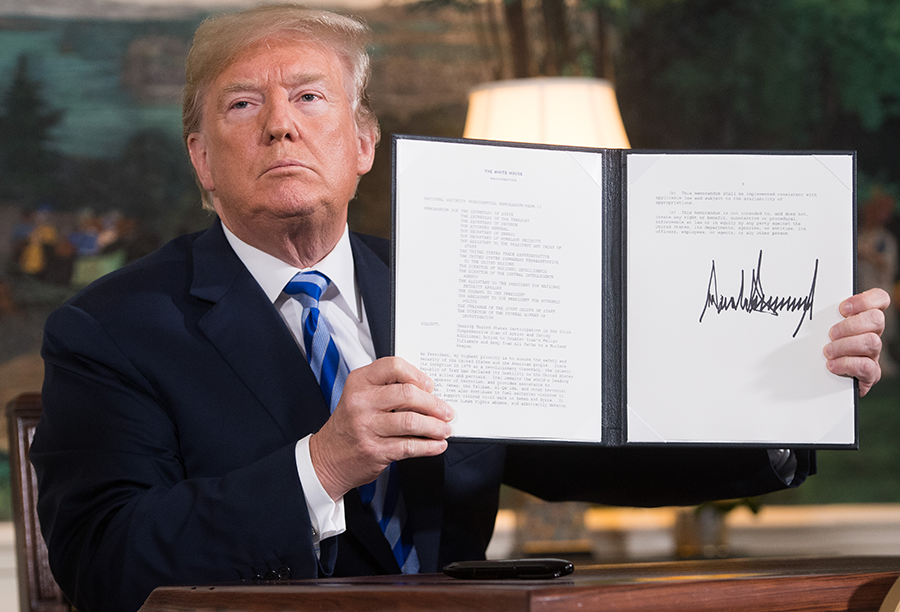“We continue to count on the valuable contributions of the Arms Control Association.”
Trump’s Failing Iran Policy
June 2019
By Daryl G. Kimball, Executive Director
One year after President Donald Trump withdrew the United States from the multilateral 2015 Iran nuclear agreement, the deal is in deep trouble. Known formally as the Joint Comprehensive Plan of Action (JCPOA), the deal has successfully rolled back Iran’s nuclear capabilities and put its activities under tighter monitoring, easing international concerns about Tehran’s nuclear ambitions.
 Not surprisingly, Trump’s ill-conceived “maximum pressure” campaign, which involves reimposing sanctions that were lifted when Iran met key JCPOA requirements, has done nothing to force changes in Iran’s regional behavior or push Iran into accepting new U.S. demands. Rather, the policy has sharply increased tensions in the Persian Gulf and decreased Iran’s incentives to continue compliance with the JCPOA.
Not surprisingly, Trump’s ill-conceived “maximum pressure” campaign, which involves reimposing sanctions that were lifted when Iran met key JCPOA requirements, has done nothing to force changes in Iran’s regional behavior or push Iran into accepting new U.S. demands. Rather, the policy has sharply increased tensions in the Persian Gulf and decreased Iran’s incentives to continue compliance with the JCPOA.
In response to U.S. moves to further tighten sanctions earlier this spring, Iran announced on May 8 that it would no longer adhere to JCPOA limits on stockpiling heavy water and low-enriched uranium. Iran also gave the other parties to the agreement (China, France, Germany, Russia, the United Kingdom, and the European Union) 60 days to help it thwart U.S. sanctions on oil sales and banking transactions, or else it will take additional measures with more significant proliferation implications.
With its existing heavy-water production and uranium-enrichment capacities, Iran could soon breach some of these limits. Any violation of JCPOA restrictions is cause for concern, but Iran’s plan to exceed the agreement’s limits on storing more than 130 metric tons of heavy water and 300 kilograms of 3.67-percent enriched uranium-235 would not pose an immediate proliferation risk. By comparison, in June 2015 Iran had a stockpile of approximately 11,500 kilograms of LEU in all forms. It takes roughly 1,050 kilograms of LEU in gas form and enriched to weapons-grade to produce a significant quantity for one bomb.
A bigger problem would arise if Tehran resumes enriching uranium to 20-percent levels or restarts construction of the unfinished Arak heavy-water reactor. Although the reactor is years away from completion, it could provide enough plutonium for two nuclear weapons every year if the plant’s original blueprints are followed. More worrisome would be the resumption of enrichment to 20-percent levels, which would significantly decrease the time needed to acquire enough material for a bomb.
What is most tragic about the growing crisis is that Trump’s decision to violate U.S. commitments under the JCPOA appears to be based on a set of falsehoods and misconceptions that Trump and his senior officials continue to repeat.
In May 27 comments to reporters, Trump said, “I’m looking to have Iran say, ‘No nuclear weapons.’ If you look at the deal that [Vice President Joe] Biden and President [Barack] Obama signed, [Iran] would have access, free access, to nuclear weapons.”
Nonsense. Through the JCPOA, Iran reaffirmed its obligation never to pursue nuclear weapons and, more importantly, agreed to restrictions and a monitoring system that far exceed Tehran’s obligations under the nuclear Nonproliferation Treaty. The International Atomic Energy Agency (IAEA) has repeatedly confirmed that Iran is implementing the terms of the JCPOA.
The JCPOA’s limitations on Iran’s nuclear activities block Iran’s pathways to the bomb and prevent the nation from being able to amass enough bomb-grade nuclear material for one explosive device in less than one year. Moreover, any Iranian efforts to ramp up its fissile material production for weapons would be detected by the IAEA and national means of intelligence well in advance.
The JCPOA is not perfect, but it is a strong agreement that provides a solid basis for negotiating a follow-on agreement to extend key nuclear limits in ways that advance international security.
Instead, team Trump has chosen to reimpose sanctions to destroy Iran’s economy and, his pro-war national security advisor, John Bolton, hopes, the regime itself. But Trump’s strategy has failed to persuade anyone in Iran or any of the U.S. partners to the JCPOA that they come back to the table to negotiate a new, “better” deal.
Sadly, Trump does not seem to understand that his administration’s campaign to dismantle the most effective and durable barrier against an Iranian nuclear bomb—the JCPOA—only heightens the risk that Iran will leave the JCPOA and greatly expand its nuclear capacity.
The most responsible path forward in the face of the Trump administration’s gross violations of the nuclear deal is a more robust and effective effort by the JCPOA’s remaining parties to facilitate legitimate trade with Iran. It is also in Iran’s interests to exercise nuclear restraint, continue to cooperate with the IAEA, and refrain from taking further steps that increase the risk of conflict in the Middle East.
If the remaining parties can keep the JCPOA alive, then it may be possible for the next U.S. president to rejoin the JCPOA in 2021 and pursue a new round of talks on a follow-on agreement that addresses mutual issues of concern. If not, Trump may well have reignited a proliferation crisis in the volatile Middle East.
